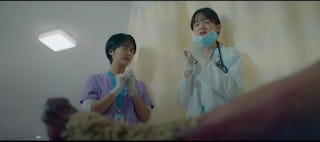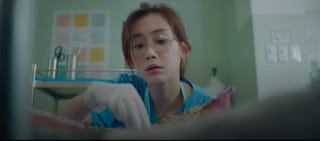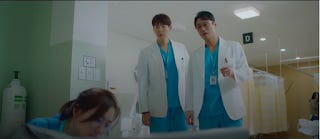Hospital Playlist Retrospective Season 1 Episode 2
As this is a post written in retrospective, it contains many spoilers for the episode in question and subsequent episodes. Read at your own risk.
Giving more weight to the idea that Jeong-won and Jun-wan are on antithetical parallel tracks, the show has Jeong-won commenting in a three way conversation about office space and privacy that he and Jun-wan are "soulmates". Although uttered glibly by Jeong-won to deflect criticism of not keeping his promises, it is a remark that has long ranging reverberations. By way of a preamble I will suggest that the drama compares and contrasts their individual trajectories with regards to work/calling and love lines all throughout the drama. This thesis will be explored in greater detail in future posts when these contrasts become more evident.
Because of what comes later, I believe that this episode is far more pivotal than I was previously led to think. It is a crucial set-up for what will prove to be key relationships in time to come. This was not always my view because after its initial broadcast, I hadn't bought into the lives of the hospital's residents and their dynamic with their professors. At the time I hadn't yet come to grips with what this episode was really trying to do.
It is easy to forget that the Korean title reads as Wise Doctor Life. With this in mind, Yulje Medical Centre is as much a place of learning as it is a place of healing. The hierarchical system although like everything else is subject to abuse, is meant to ensure that effective mentoring takes place so that quality patient care is maintained at the highest levels. The introduction of the residents and their role in this narrative is a purposeful reminder of that. But it isn't a one-way street. For good learning to occur, good teaching and modelling is a pre-requisite. So responsibility rests as much on those who hold greater authority as it does on those who are looking to them for guidance. It should be a sobering thought to those who are tempted by the trappings of power. Rank is rightly based on experience but with that comes the burden of responsibility.
This aspect of the drama reminds of an old UK tv show, Upstairs and Downstairs where the lives of the upper class and their servants were showcased. I believe that this was similar to the popular Downton Abbey. While the vast majority of professor do not behave like overlords and masters but sagacious teachers, some do. In this episode we are also introduced to two medical students, Hong-do and Yun-bok (who are right at the bottom of the food chain) from whose eyes we survey the intricate goings-on around the hospital. The man who gets around the hospital hobnobbing with everyone is Ik-jun, the lovable busybody of Yulje. His movements take him all over hospital, even downstairs to the cafeteria where in this episode he substitutes for the regular server with mixed results. What's more fun is that even the director has his meals in the cafeteria.
Much has been said about the contrasts in personality and doctoring styles between the ER fellow Dr Bae Jun-hui and GS 3rd year resident Dr Jang Gyeo-ul. It's practically handed to us in blazing lights by the presence of Jeong-won in both cases. Bae Jun-hui is a personable and experienced ER doctor who communicates well with anxious caregivers. When Ahn Jeong-won witnesses her interaction with a mother, he smiles approvingly of the outcome of this event. On another occasion when Jang Gyeo-ul speaks to a caregiver in a plain, unfiltered way, he pulls her aside and chides her for being irresponsible and too quick to go to the worse case scenario with no thought to the mother's feelings. "Doctors must take responsibility for their words".
However, not as much has been said about how Jang Gyeo-ul has been mentored up to this point. How has a 3rd year resident not been pulled up for the deficiencies in the way she interacts with caregivers prior to this? That was a question that struck me forcefully this time round. Shouldn't her mentors have been on to this before? Why is Ahn Jeong-won, newly arrived at Yulje, the first person to make this a learning moment?
It's certainly an interesting question to pose and perhaps it goes someway in foreshadowing the nature of their future mentor-apprentice dynamic. Perhaps the other professors are fearful of causing offence to their only and much valued GS resident. She's a rare breed that they are obligated to pander to. Everyone wants a piece of her. Ahn Jeong-won who is used to working on his own, apparently doesn't need her to the point that he is worried about upsetting the applecart. It could also be much more than that. Jeong-won expects better especially when he still believes that this hospital belongs to his family. Therefore he could be demonstrating latent leadership qualities that sees him wanting more from his subordinates and demanding it of them. Nevertheless, to ensure that her dignity as a clinician remains intact, he calls to one side and lectures her on the dos and don'ts in communicating with patients and carers.
Here Jeong-won is obviously being contrasted with the publicity hound Professor Min, the new chief of neurosurgery, who in front of cameras flaunts confected outrage and publicly shames a subordinate, the chief resident Yong Seok-min to cover up his own shortcomings. Jun-wan, on the hand, appears to be a hard-task master to his chief resident Do Jae-hak but underneath his cantankerous demeanour is man who takes responsibility for his actions and words.
Pulling Gyeo-ul to one side and drawing the curtains around them, Jeong-won demonstrates a sensitivity and consideration for her dignity as a doctor but when Dr Bong interrupts this exchange, he rips open the curtain and asks them what they've been up to in a way that suggests that he has inadvertently intruded onto a moment of unspoken intimacy. It is highly suggestive and on hindsight it signals the beginnings of what becomes the Winter Garden dynamic.
Does this contradict what he says later to his friends, "Each doctor has his/her own methods and stories"? It doesn't have to. The one truism is not necessarily invalidated because there are other truths that counterbalance its application. For Jeong-won especially the statement comes back to haunt him when he witnesses the seminal maggot scene.
The incident with Jang Gyeo-ul leaves him with an unfavourable impression of her. When Ik-jun expresses surprise that they have worked together on occasion, Jeong-won declares, "She's not my cup of tea." Or literally, "She doesn't fit me." A statement rich in dramatic irony for those of us who have journeyed with them from start to finish. For someone who is a fan of Pride and Prejudice, it has resonances of Mr Darcy saying, "She's tolerable enough but not handsome enough to tempt me." Jeong-won is immediately cast from that template. They don't hit it off to begin with but an event occurs not long after he makes this statement that changes his perception of her forever.
Dr Bong takes a call from the ER that a homeless man with a frostbitten leg has been brought in. His leg has rotted to the point that it is infested with maggots. Jeong-won is present during the call and when he hears Jang Gyeo-ul's name mentioned, he follows Dr Bong to the ER. Presumably thinking that the aloof Dr Jang will be screwing this up too. To contextualize the situation clearly, the show makes it a point to show the general revulsion of those who see the man's leg. The usually competent ER ladies, Jin-hui and Hui-su are at a loss as they look on wincing. In walks the unflappable Dr Jang and without a second thought, she puts on gloves, crouches down and pulls the maggots off the man's leg. Everyone looks on stunned. The two professors arrive at the scene and are stopped in their tracks. Dr Bong mutters, "She's quite something." The camera zeroes in on Jeong-won's reaction. From that moment on his view of her undergoes a profound change. Whether he is reminded of the saints of old doing self-sacrificial acts or the gospel account of Jesus washing his disciples' feet, something about seeing her doing what others revolt at, moves him deeply. The seemingly unfeeling Gyeo-ul highlights the patient's humanity with her actions. Moreover, the very flaw that saw her being blunt with a patient is now a strength as she unflinchingly removes the maggots. In doing so she elevates his importance as someone not to be feared.





I now take very seriously the implication that Jeong-won began developing feelings for Gyeo-ul during the maggot scene. I wouldn't have said that during my earliest viewings but with the ER flashback that we're given in the season finale, I think it's possible to come to that conclusion with a high degree of certainty. Whether he is aware of it at the time remains a mystery. Even if it isn't a case of "love at first maggot" for Jeong-won, he learnt something that day. Yes, even the super pediatrician has something he can learn from his subordinate. What is even more fascinating as I'm rethinking all of this is that "the Good Samaritan" case also features a homeless man. Hence I am in little doubt that the two incidents are meant to be paralleled.
"The Good Samaritan" case becomes a dilemma for Song-hwa because she is repeatedly asked to step in and take over by Seok-min who is gravely concerned about Prof Min's inexperience (and hubris) with a complex surgical procedure to remove a tumour. She is afraid to overstep her boundaries with the new chief which may cause him to lose face thus showing herself to be disrespectful to a senior and an elder. "The Good Samaritan", Gong Hyeong-u, has become something of a media sensation for his deeds among the homeless and all eyes on are on Yulje to do well in his surgery. In the NS conference to discuss Gong Hyeong-u, the doctors are deliberating over issues such as the patient's quality of life and the prospect of bad publicity for the hospital. An equally important component to this is the skill of the doctor.
In the tug-of-war over who should do Gong Hyeong-u's medical procedure, it is easy to forget that he isn't a trophy to be haggled over but a man with feelings and choices. This is why Song-hwa insists that Seok-min apologize to Gong Hyeong-u before she participates in his surgery.
The second NS conference where the med students talk about the reason for going into medicine now takes on new meaning in light of what we know about their connection with Song-hwa. More importantly there is a telegraphing of Chi-hong's role in the love line stakes as he observes with discomfiture Song-hwa doing a foot rub during the proceedings.
In relation to lovelines, we also find out in this episode that Song-hwa has broken up with her boyfriend, Professor Jang after he confesses that he has been cheating on her. Throughout the episode we see her on Jun-wan's case for not telling her sooner of his infidelity, particularly during the kalguksu scene when he's on the defensive saying that it's not something anyone could do so easily. At the end of the episode we see that Jun-wan did confront the erstwhile boyfriend in his office and tell him to come clean. In that exchange Prof Jang cast aspersions on Jun-wan's motives for coming to see him, implying that Jun-wan has feelings for Song-hwa. To this Jun-wan says to him, "You're so old-fashioned" meaning that men and women can be lifelong friends and have a platonic dynamic. So as far as Jun-wan is concerned, Song-hwa is a really good friend that he cares about. There are no latent romantic feelings. As far as I'm concerned this is a declarative statement to the audience that there's no reverse harem at play. That Song-hwa's male friends are just close friends and confidants.
The Flawed Five attend another funeral, that of Jong-su's wife. Here we are also witness to the lifelong friendship between Rosa and Jong-su. It does beg the question. Why didn't they marry each other? Was it ever a consideration? Well, perhaps it's the writer saying that it isn't all about first loves. Maybe men and woman can remain close friends with no thought of dating and marriage. Maybe one party (Jong-su in this case) didn't have those sorts of feelings for the other (Rosa) even if Rosa might have had for him. Maybe neither ever thought of each other in that way. It is suggestive, however, that she told her son in the previous episode that she married for convenience whereas we're told in this one that Jong-su was completely devoted to his wife throughout their entire married life.
The kalguksu scene is also important not only of what it says about the Five's friendship (the good-natured bickering is always a joy to watch) but also what it says about Jeong-won. There is another side to Jeong-won... the calculating manchild who pushes back when others cross the line. It is also evidence that he might be more of his father's son than first meets the eye especially when he accuses Song-hwa and Jun-wan of gluttony and spouts off about the ownership of the hospital and whose money is paying for the meal here. These are, to my mind, hints of his larger trajectory.
In terms of his larger personal trajectory, we also see Jeong-won pulling in to the hospital hurriedly, not once but twice when called in for an emergency, signifying even in these early days what his true passion and calling is.
The Biblical resonances here suggests an overarching Christian worldview that is at play. The good Samaritan reference is key to understanding this. This is a parable told by Jesus in the gospel according to Luke about a man travelling on a lonely who was mugged by bandits and left to die. People who were religious walked by and did nothing for him because they feared for their lives and feared being tainted. But a Samaritan, historical enemies of the Jews stopped by, helped the man and ensured his full recovery going the extra mile. Jesus told this story when a religious teacher asked him, "Who is my neighbour?" Jesus' point was not just about helping those in need but that the person in need demands our attention because of their inherent value as an image bearer of God just as we believe in our own inherent value as God's image bearers. "Love your neighbour as yourself." Considering what's going on presently on the world stage, it's a subject matter that is always topical. All people should be treated with respect, from the unlikeable egotistical Professor Min to the homeless men because they are all made in the image of God. The Christian worldview emphasizes this. All lives matter.


